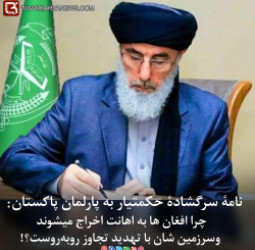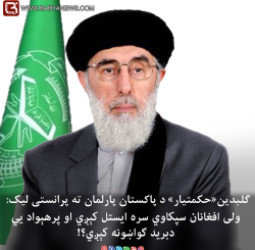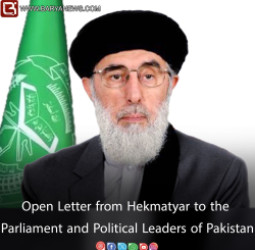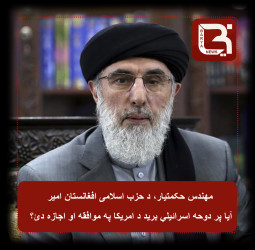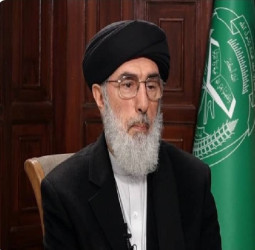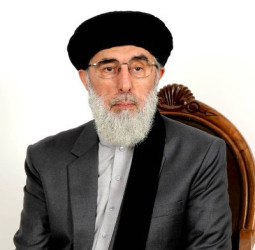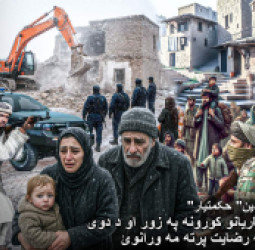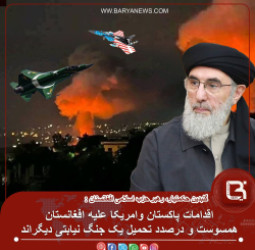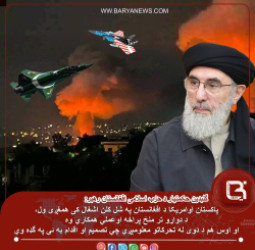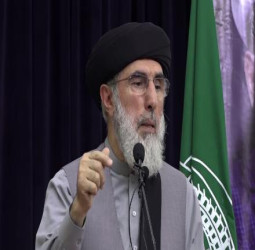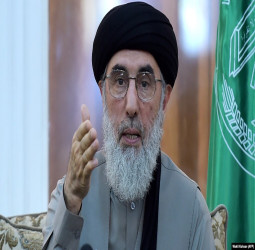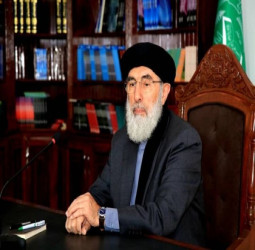بسم اللَّٰه الرحمٰن الرحيم
To the Parliament of Pakistan
An
Open Letter
On behalf of the believing people of Afghanistan
Accept my greetings, respects, and good wishes.
Regarding the tense and warlike situation between Afghanistan and Pakistan, I
have several petitions to present:
We are hearing dangerous news and threats of dire consequences from Islamabad — threats of direct war. We do not understand why sensible and believing Pakistanis and members of Parliament remain silent and do not prevent such irresponsible threats. Why is it that what India desires is taking place? Why is the revenge of the BLA and TTP being taken on the Afghan people and Afghan refugees? Their operations had begun at a time when NATO forces were still in Afghanistan; America had granted India permission to train and nurture armed groups against Pakistan.
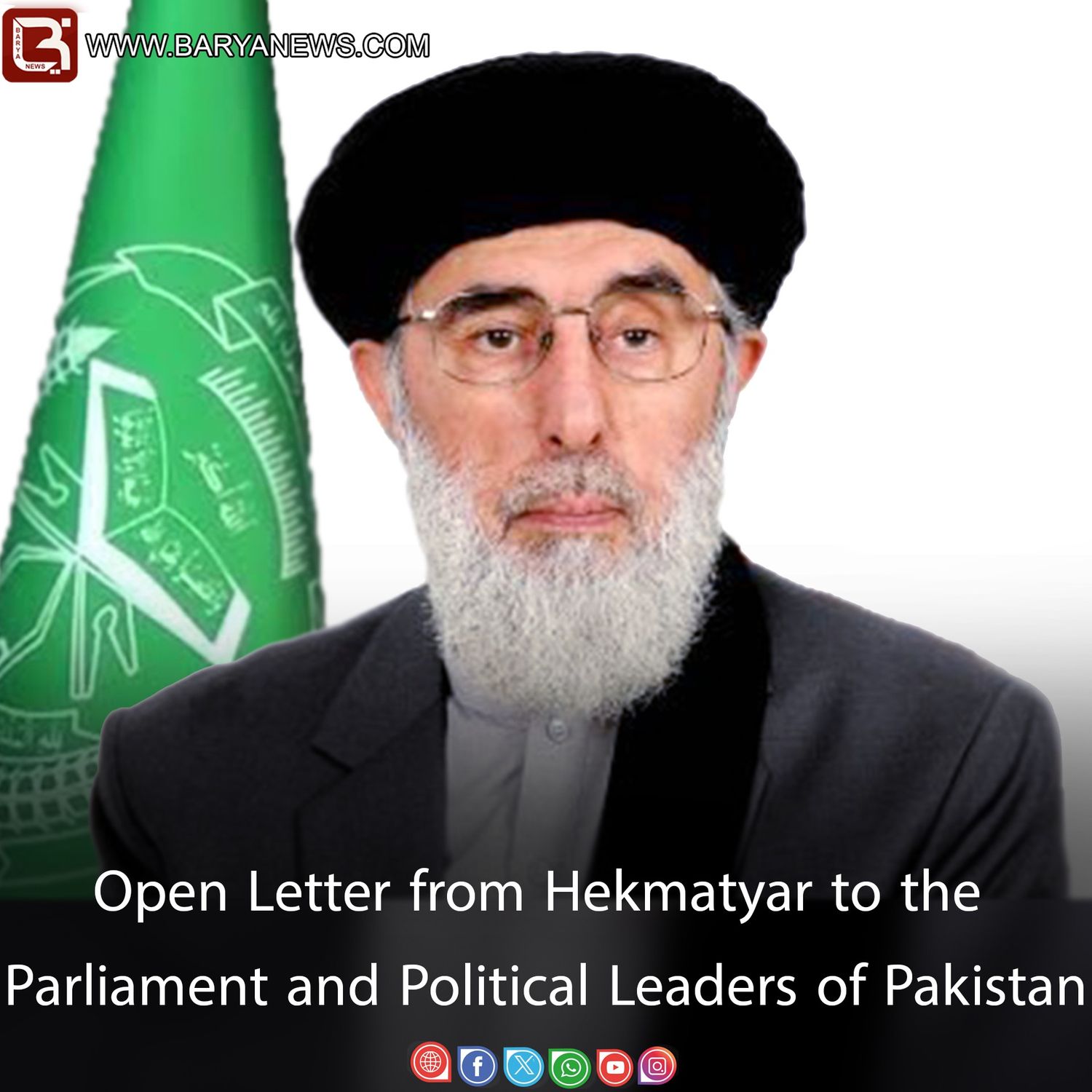
Two Muslim neighboring countries stand at the threshold of a dangerous war. Several million refugees are being expelled by force, with humiliation and insult, and their homes are being demolished with bulldozers — contrary to mercy, decency, and human morals! We do not understand why the Parliament of Pakistan does not take a clear and decisive stance regarding this sensitive situation and does not prevent its bad consequences. A proud nation is being insulted and its country threatened with attack — a nation that has been the victim of its neighbors’ wrong policies; that for half a century has seen its blood shed in bloody wars imposed by foreign invaders; whose villages and homes have been destroyed; whose people have been forced into exile; and who have given hundreds of thousands of martyrs. These are the consequences of the cruel invasions first by the Soviet forces and later by America and NATO.
The Soviet forces did not come from Moscow merely to occupy Afghanistan; they were not content with seizing our country alone. Rather, their soldiers’ slogan was: “We will untie our bootlaces on the shores of Karachi.” Had the Red Army not been stopped in Afghanistan, surely that would have happened. Pakistan would not only have hosted the Soviet Red Army but would have faced a joint invasion by the Soviets and India — and the outcome would undoubtedly have been disastrous and irreparable. The jihad and resistance of the Afghans were what saved Pakistan from a joint invasion and dismemberment by Moscow and Delhi. Every patriotic and reasonable Pakistani understands and acknowledges this reality.
I remember the days when everyone — from ordinary Pakistanis to the President — used to say: “The Afghan jihad is the defense of Pakistan.” You too will recall the days when the then President, the late Zia ul-Haq, in response to pro-Soviet and anti-Afghan-jihad parties, said:
“Some are spreading propaganda that Afghan refugees intend to remain in Pakistan permanently, whereas Afghans are patriots — they are sacrificing for the freedom of their country. On the day they liberate their homeland, they will all return. And if, by chance or by some miscalculation, some remain, what harm will it cause? But can one hundred million Pakistanis not tolerate three million hardworking Afghans? I myself am a refugee from India, and millions like me are refugees.”
Then why is the entire Afghan nation being insulted and called ungrateful? Afghans recognize and appreciate the favor of the Pakistani people, who granted refuge to the refugees and supported our Islamic jihad and struggle for freedom. But this was something Pakistan was religiously obliged to do — and rationally and morally, it had no other alternative.
The refugees are those who migrated to Pakistan because of the invasion of the Soviet forces — those whose more than 1,200,000 homes were destroyed by that same common enemy, forcing them to go to Pakistan. There they lived in scorching deserts; they built mud huts for themselves; they left their young sons in the battle trenches — one martyred, the other sent to replace him. God knows, had it not been for their sacrifice and resistance, what fate would have befallen Pakistan after Afghanistan! The Soviets would have attacked Pakistan from the west and India from the east, and inside Pakistan, the pro-Russian and pro-Indian parties would have done exactly what their comrades did in Afghanistan.
I do not know whether those who today call Afghans ungrateful remember that these same groups once waved red flags in Pakistan’s cities and danced for the arrival of the Soviet forces? Do they not remember that the then President repeatedly said: “We are indebted to the Afghan Mujahideen who stopped the Soviet forces. If they and their resistance had not existed, confronting the Soviets in Pakistan would have been extremely difficult. If the Soviets had crossed the high mountains and narrow passes of Afghanistan, confronting them on Pakistan’s plains would have been almost impossible.”
Why then do we no longer hear from Pakistan’s rulers the same statements that reflected the realities of thirty-five years ago? Now, in the year 2025, Pakistan’s population has increased to about two and a half times what it was then (255 million). Why was there no impatience or weariness toward these oppressed refugees then, but there is today? Why have those earlier statements been forgotten? Why do they now call their benefactors ungrateful? And why are they demolishing the homes of these oppressed refugees with bulldozers — homes built with the calloused palms of their hands and the sweat of their bodies — while today Pakistani police, with force and unprecedented humiliation and insult, expel them from their homes and destroy those houses with bulldozers!
Can any reasonable Pakistani deny that if Pakistan has become the only nuclear Islamic state, it is because of the blessing of the Afghan jihad? If that jihad had not occurred, America would never have allowed Pakistan to develop the atomic bomb.
Whether the earlier refugees remained in Pakistan or others went there because of the war imposed by America, Islamabad shares responsibility — because it fully supported America in the occupation of Afghanistan. America’s invasion also came through Pakistan’s airspace and land, and its supplies also passed through Pakistan. How many Afghans did General Pervez Musharraf hand over to America with their hands tied?
If, after the withdrawal of the Soviet forces, a government had been formed in Afghanistan according to the will of the Afghan people, and if Islamabad had not joined and supported the alliance favored by the KGB and CIA, then neither would the refugees have remained in Pakistan until today, nor would the matter have reached America’s twenty-year occupation of Afghanistan, nor would Pakistan and Afghanistan today be standing at the threshold of a bloody inter-Muslim war.
The ongoing war in Afghanistan began at the time when Moscow carried out a coup through the pro-Soviet communist officers under the leadership of Sardar Daoud; the monarchical system was overthrown, and power came into the hands of the communists. Along with this, the series of explosions began in Pakistan. At that time, the People’s Party government was in power in Pakistan. I was under pursuit by the Daoud government, and an execution sentence in absentia had been issued against me; many members of Hezb-e-Islami had been arrested, and some had been martyred. Some Afghan and Pakistani brothers sent me a message saying that the government here was ready to grant us asylum.
I went there at a time when I could hear the sounds of explosions every day. The then Chief Minister of the North-West Frontier Province, Hayat Muhammad Sherpao, was assassinated; his killer had been trained in Kabul and was linked to a group whose leaders had all gone to Kabul and settled there, waiting for the day when, like Babrak, they would be brought to Islamabad in Russian planes and tanks.
Along with Daoud’s coup, red flags were being waved in Pakistan; they wore red caps and danced for the arrival of the Russian forces; in their poems and slogans, they invited them to come. Those who are aware of the historical facts know that the chain of explosions and assassinations in Pakistan began at that time, and this chain stopped when the first groups of Afghan refugees reached Pakistan.
The refugees contributed to Pakistan’s security; they were not the cause of its insecurity. Pakistan’s instability stems either from the interference of its powerful rivals or from Islamabad’s own wrong policies.
You must also know that Iran had more Afghan refugees than Pakistan; but today it has asked the Kabul government to send two hundred thousand (200,000) Afghans to Iran under the name of labourers. Kabul, in this regard, is cold and silent, but Tehran is in great haste and urgency. It has also begun the process of issuing nine-month visas. Sensible people, aware of the region’s sensitive situation, well understand what lies behind this decision: the warlike atmosphere of the region, the threats of America and Israel to Iran, Pakistan’s warnings of attacks on Kabul, and so on — all have caused Tehran to make this deal with Kandahar. Many analysts believe that this issue is connected to a warlike condition between Afghanistan and Iran.
If the old events have been forgotten, do you remember when the Taliban entered Kabul four years ago? Islamabad was very pleased; it repeatedly sent congratulatory messages to Kabul, dispatched high-level delegations, and some Pakistani officials said: “This is a great victory for Pakistan; it was we who twice brought the Taliban to Kabul.”
What happened that those who were friends yesterday have turned into such enemies today that now Pakistani warplanes are dropping bombs near Kabul’s Arg Palace on certain targets? Pakistan says: these strikes were on TTP hideouts and on the vehicle of their leader; but the Taliban do not accept this and say: a fuel tanker exploded here! The reality is hidden from no intelligent Afghan or Pakistani.
Along the Durand Line, in nine provinces, bloody battles have erupted, leaving hundreds dead and wounded. And during the second phase of the Istanbul talks, Pakistan’s Defense Minister said: “If the talks are fruitless, we will begin a direct war with the Taliban.” And in response to these threats, India said: “We will stand alongside the Taliban.”
The President of America, Trump, said: “I will resolve the dispute between Afghanistan and Pakistan very soon and easily.” But his former ambassador came to Kabul, met senior officials, and said: “The recent clashes between Pakistan and Afghanistan have raised the international credibility of the Emirate and shown that the Taliban are independent and sovereign.” Meaning that he was encouraging the Taliban toward war! So whose representative and spokesman is he — America’s or India’s? For whom does he advocate war and lobby?
It is appropriate to remind you here of an incident from that time when the White House and the Kremlin agreed that the Soviet forces should withdraw from Afghanistan honorably and safely, without their convoys being attacked; that Najib’s government should remain in place; that Moscow’s financial and military support for it should continue; that all assistance to the Mujahideen should be cut off; and that in Kabul a coalition government favored by both Moscow and Washington should be formed, bringing together pro-Soviet communists and pro-American Westernists. Their mission was to complete the unfinished war of the Soviet Union, to disarm the Afghans, and to prevent the establishment of an Islamic government by the Mujahideen in Afghanistan.
The relevant agreement was signed in Switzerland. America announced that it wanted the Soviet forces to leave Afghanistan honorably and safely, without their convoys being attacked during withdrawal. Regarding this agreement, we announced that it was only an understanding between the White House and the Kremlin; Afghans were neither present in it nor bound by its commitments. The Mujahideen’s attacks on the Russian forces would continue until the last Russian soldier left Afghanistan.
At that time, Pakistani officials told me that an important American officer wanted to meet me, saying he had a special and important message for me; they did not know what the message was. During the meeting, I heard something that astonished me, and I wish to tell you that today: he had requested the meeting to convey to me the message of President Reagan:
“The President sends you his greetings and good wishes and says: we appreciate and support your decision to continue attacks on the Russian forces.”
I was astonished that the President, on one hand, made this commitment to Gorbachev and declared publicly before the whole world that he wanted the Soviet forces to leave Afghanistan honorably and safely, yet secretly valued my decision that the Mujahideen’s attacks on the Soviet forces would continue until the last soldier crossed the border.
Today that same earlier experience is being repeated: one thing is said openly about the war between Afghanistan and Pakistan, and secretly the exact opposite is done.
The armed opponents in Pakistan were neither created by the Taliban nor by any other Afghan group; they became active during the twenty-year occupation. If India has nurtured and trained some groups, the blame lies with America, which gave India permission to conduct intelligence operations against Pakistan through Afghanistan. If Pakistan has any grievance in this matter, it should be against America, not the Afghans.
Bearing this in mind, Pakistan became displeased with America and in 2004 resumed helping the Taliban, continuing until 2021. The leader of a Pakistani religious-political party addressed the government, saying: “Why did you send thirty thousand (30,000) Pakistani youths (the Taliban) to Afghanistan for fighting?” These youths were not sent to fight against the Soviets nor against America, but rather for internal wars and for supporting the Afghan Taliban. Thousands of them were killed when America began its attacks in northern Afghanistan — some by bombs and missiles, some after being captured and executed — and a number of them, after long captivity, were handed back to Pakistan.
In light of these facts, it is hoped that Islamabad will adopt a new, constructive, and permanent political policy regarding Afghanistan, so that both Muslim neighboring countries may resolve their disputes in a just and reasonable manner, with patience and wisdom — and without interfering in each other’s internal affairs or supporting and assisting armed opposition groups.
With respect.


